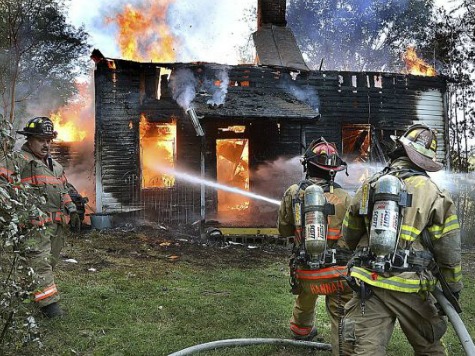
As private homes and businesses across the country join the “green” movement by adding solar panels to supplement their energy systems, fire departments are finding that the devices represent a series of dangerous unintended consequences in fighting structure fires.
One problem with solar panels is that they are not often equipped with an easy way to be disconnected, so when firefighters begin spraying water around in an effort to quench a fire they can be injured and even killed by the electric current.
Another unforeseen consequence of solar panels is a switch in strategy by firemen, a switch that does not end up favoring the owner of a burning building.
Often, when firefighters cannot quickly or easily get to a roof to cut the lines to solar panels or to otherwise fight a fire, they employ what is called “defensive” firefighting. With this tactic, fire crews focus on keeping surrounding buildings from catching fire instead of attempting to put out the original fire. In other words, owners of buildings with solar panels could find firefighters doing nothing to save their property as a direct result of having solar panels.
An additional problem is that banks of solar panels and the accompanying cables and hardware make it harder for firemen to cut ventilation holes through roofs in emergency situations.
Fire Chief Brian Duggan of Springfield, Massachusetts recently noted that during a fire in Easthampton it took 25 minutes to cut a ventilation hole through a roof, but if solar panels were there it would “elongate that time by approximately double.”
In another case, a fire at an industrial complex near Philadelphia burned for 29 hours as firefighters could not get to the roof because it was covered with energized solar panels.
The panels are heavy and represent a dangerous possibility of a roof collapse, and are also made of materials that become toxic during a fire.
“When we have crews going inside and when we have crews going up on the roof we’re running the risk of having a structural collapse,” L.A. County Fire Inspector Scott Miller said. “We should have our face pieces on and also when they’re exposed to fire they also release harmful chemicals into the atmosphere.”
Firefighters across the country are adding new training to deal with this difficult situation and the energy industry is also looking into ways to mitigate the danger, but in the meantime it is a danger little understood by home or business owners rushing to join the green energy revolution.

COMMENTS
Please let us know if you're having issues with commenting.